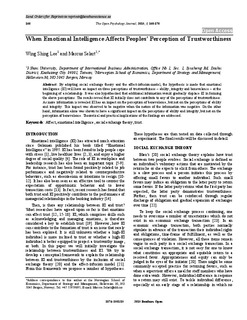| dc.contributor.author | Lee, Wing Shing | |
| dc.contributor.author | Selart, Marcus | |
| dc.date.accessioned | 2016-01-12T11:45:20Z | |
| dc.date.accessioned | 2016-09-01T12:33:47Z | |
| dc.date.available | 2016-01-12T11:45:20Z | |
| dc.date.available | 2016-09-01T12:33:47Z | |
| dc.date.issued | 2015 | |
| dc.identifier.citation | Open Psychology Journal 2015, 8:160-170 | nb_NO |
| dc.identifier.issn | 1874-3501 | |
| dc.identifier.uri | http://hdl.handle.net/11250/2403527 | |
| dc.description | -Open Access | nb_NO |
| dc.description.abstract | By adopting social exchange theory and the affect-infusion-model, the hypothesis is made that emotional
intelligence (EI) will have an impact on three perceptions of trustworthiness – ability, integrity and benevolence – at the
beginning of a relationship. It was also hypothesized that additional information would gradually displace EI in forming
the above perceptions.The results reveal that EI initially does not contribute to any of the perceptions of trustworthiness.
As more information is revealed EI has an impact on the perception of benevolence, but not on the perceptions of ability
and integrity. This impact was observed to be negative when the nature of the information was negative. On the other hand, information alone was shown to have a significant impact on the perceptions of ability and integrity, but not on the
perception of benevolence. Theoretical and practical implications of the findings are addresse | nb_NO |
| dc.language.iso | eng | nb_NO |
| dc.subject | affect | nb_NO |
| dc.subject | emotional intelligence | nb_NO |
| dc.subject | social exchange theory | nb_NO |
| dc.subject | trust | nb_NO |
| dc.title | When emotional intelligence affects peoples’ perception of trustworthiness | nb_NO |
| dc.type | Journal article | nb_NO |
| dc.date.updated | 2016-01-12T11:45:20Z | |
| dc.source.pagenumber | 160-170 | nb_NO |
| dc.source.volume | 8 | nb_NO |
| dc.identifier.doi | http://dx.doi.org/10.2174/1874350101508010160 | |
| dc.identifier.cristin | 1310923 | |
